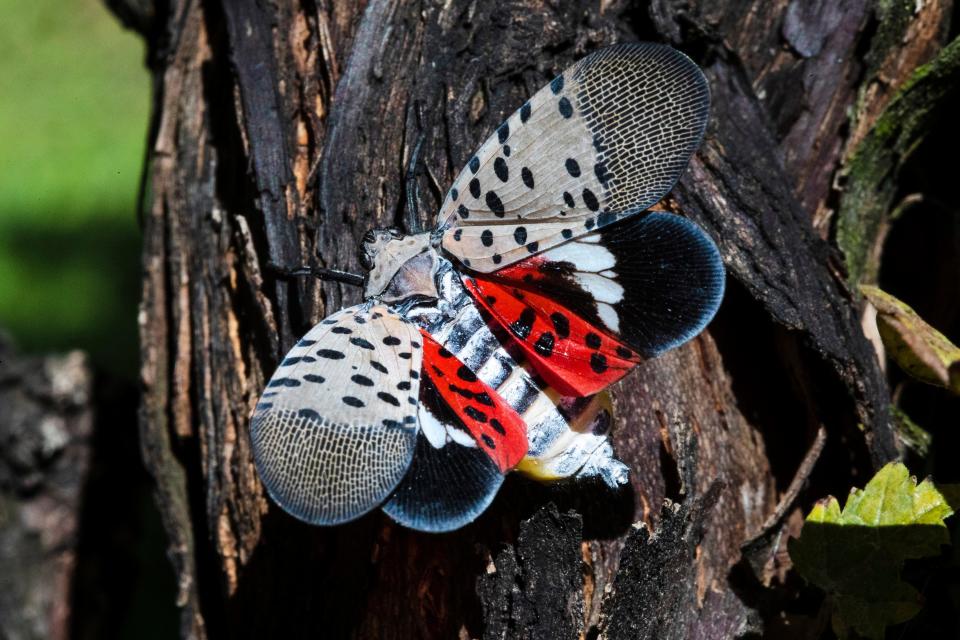Fact check: Claim that lanternflies are toxic to pets is missing context

The claim: The spotted lanternfly is toxic to pets
The internet is abuzz with photos and stories about the spotted lanternfly, an invasive pest known for destroying vineyards, fruit trees and forest ecosystems.
Agricultural officials in states like Pennsylvania, New Jersey and Ohio have asked people to squash the colorful insect immediately if they see one due to its destructiveness and ability to create black mold.
But on social media, some people are sharing a different warning that claims the spotted lanternfly is toxic to dogs.
“Ingested, they can cause seizures. Stepped on, they can cause a dog’s pads to blister,” reads a Sept. 17 Instagram post that accumulated more than 3,000 likes in less than a week. “It doesn’t matter if the spotted lanternflies are dead or alive, they are still toxic.”
Below the text is an image of the spotted lanternfly, which has gray wings with black spots and red underwings.
“If you see this #lanternfly kill them if you could and report to your local authorities,” the user captioned the post. “Keep your dogs safe and away from them.”
While state governments are trying to prevent the spread of the spotted lanternfly, it’s not because they’re toxic to dogs. Experts who spoke with USA TODAY said there’s no evidence the insect is dangerous to pets – and more research is needed.
Fact check: No evidence drinking grape juice will prevent, treat stomach flu
The social media user who shared the post did not return a request for comment.
No evidence insect is toxic to dogs
The spotted lanternfly was first detected in North America in 2014. The insects have recently spread across the Northeast and Middle Atlantic, and they can damage more than 70 types of plants.
But Amy Korman, a horticulture educator for Penn State Extension, said there is no evidence the bug is dangerous to pets and humans.
Pennsylvania's Department of Agriculture says the bug is not known to bite or attack people and pets, but it is not known if spotted lanternflies are poisonous when ingested.
The Cornell Cooperative Extension in Seneca County, Ohio, said there's no evidence the insects have caused seizures in pets or blisters on their paws, as the viral post claims. It noted, however, that veterinarians have reported upset stomach, drooling and loss of appetite in pets that ate the insect.
Similarly, George Hamilton, department chair of entomology at Rutgers University, said he is not aware of any research to determine whether the spotted lanternfly is toxic to pets.
He said such an effect is possible because the adult insects feed on the Tree of Heaven plant, an invasive species. Cornell warned “there is still reason to be cautious about your pet eating lanternflies,” pointing to a 2018 study in which researchers found spotted lanternflies sequester the toxic compound ailanthone from the Tree of Heaven.
Fact check: Tsunami reaching East Coast due to Spanish volcano highly unlikely, experts say
Penn State Extension says keeping pets away from spotted lanternflies, living or dead, and consulting with a veterinarian when they ingest anything outside of their normal diet, is the safest course of action.
Fact check: Why an FDA panel didn't recommend Pfizer's booster shot for all Americans
Patton Veterinary Hospital in Pennsylvania notes if a pet is experiencing vomiting, drooling, or loss of appetite, it could be because a pet ate other types of insects or plants, or it could be a sign of another illness. The hospital adds that a pet should be checked by a veterinarian if it is exhibiting any of these symptoms.
Our rating: Missing context
Based on our research, we rate MISSING CONTEXT the claim that spotted lanternflies are toxic to pets, because without additional information it could be misleading. There have been no studies to confirm the impact on pets, in particular the claims in this post that lanternflies can cause seizures or blistered pads. But there have been reports of lesser symptoms, and veterinarians say animals are still discouraged from eating them. More research is needed on toxin sequestration in spotted lanternflies.
Our fact-check sources:
U.S. Department of Agriculture National Invasive Species Information Center, accessed Sept. 22, Spotted Lanternfly
USA TODAY, Aug. 27, Meet the spotted lanternfly, the bug health officials are begging you to kill on sight
U.S. Department of Agriculture, May 14, 2019, Look For and Report Spotted Lanternfly
Amy Korman, Sept. 22, Email exchange with USA TODAY
George Hamilton, Sept. 22, Email exchange with USA TODAY
The Nature Conservancy, July 6, 2020, Tree of Heaven
Pennsylvania Department of Agriculture, accessed Sept. 22, Spotted Lanternfly Frequently Asked Questions
Cornell Cooperative Extension Seneca County, Oct. 29, 2020, Spotted Lanternflies and Pets: Frequently Asked Questions
Patton Veterinary Hospital, Oct. 3, 2020, Are Spotted Lanternflies Toxic to Pets?
Scientific Reports, Nov. 15, 2018, Defense sequestration associated with narrowing of diet and ontogenetic change to aposematic colors in the spotted lanternfly
Penn State Extension, Oct. 12, 2020, Spotted Lanternfly Frequently Asked Questions
Thank you for supporting our journalism. You can subscribe to our print edition, ad-free app, or electronic newspaper replica here.
Our fact-check work is supported in part by a grant from Facebook.
This article originally appeared on USA TODAY: Fact check: Claim that lanternflies are toxic to pets is missing context

 money
money 